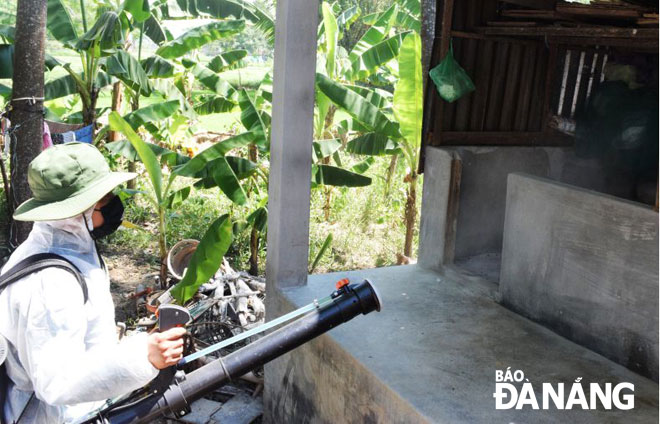Stepping up measures to prevent the spread of African swine fever
In July and August, no outbreaks of African swine fever (ASF), known as “pig Ebola” were reported in the communes of Hoa Chau, Hoa Nhon, Hoa Phu and Hoa Ninh in Hoa Vang District, Da Nang. However, soon after, other communes- Hoa Lien and Hoa Bac- were found being affected by this highly contagious disease.
 |
| A pig farm in the city being disinfected to stamp out African swine fever |
It is worth mentioning that, whilst ASF at large-scale registered pig farms has been completely stamped out, this epidemic has still raged at small-scale spontaneous ones in these locations.
To date, over 5.3 million pigs nationwide, weighing a combined total of over 305, 202 tonnes, accounting for 7% of the country’s total swine herd, have been culled as a way to beat ASF that has spread to all 63 localities.
In Da Nang, about 12,000 pigs, weighing a combined total of over 608 tonnes, have been to date slaughtered.
In order to contain the disease, Cao Xuan Thai, the Head of the municipal Agency of Animal Husbandry and Veterinary underlined a must-do to take preventive measures aimed at minimising the risk of AFS spread.
Heed should be paid to destroy any contaminated animals, preventing infected pigs from entering into epidemic-free areas, cleaning and disinfecting pig farms daily, and taking other biosecurity measures to fend off the virus. Also, dead pigs should not be dumped into rivers, streams, ponds and lakes.
Functional bodies are now making their greater efforts to tighten their monitoring of pig farms, slaughtering facilities, markets, supermarkets, and trading areas of pigs and pork products in a bid to ensure safe pork supplies in the city despite increased risks of ASF transmission.
Slaughterhouses across the city have maintained their normal operation in recent days. It is reported that about 1,100 - 1,200 pigs are slaughtered at the city-based Da Son slaughterhouse per day.
Pigs that are brought into these large slaughterhouses are mainly soured from large farms in Da Nang, Quang Nam and Binh Dinh, and of course, all of them are test negative for ASF virus.
Meanwhile, small traders selling pork at local markets said the price of pork products is slightly increasing by 10,000 – 20,000 VND per kg in the face of the falling pork supplies due to the epidemic.
Pork now accounts for three-quarters of total meat consumption in Viet Nam where most of its farm-raised pigs are consumed domestically.
ASF, which is harmless to humans but fatal to pigs, spreads through blood, faeces, and other fluids, and it can last for months on farm surfaces or equipment that has not been properly cleaned.
The epidemic was first uncovered in the northern provinces of Hung Yen and Thai Binh in mid-February and has so far affected all 63 localities in the Southeast Asian country.
A vaccine against AFS virus, developed by the Viet Nam Academy of Agricultural Sciences (VAAS), has produced initial positive outcomes on experimental scale.